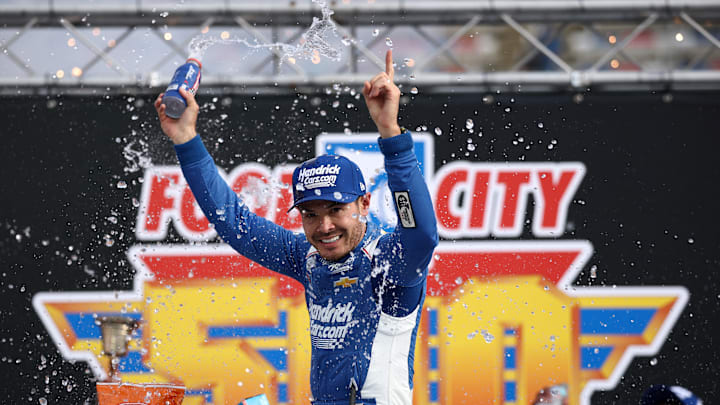It goes without saying that Sunday's Food City 500 at Bristol Motor Speedway was not a very exciting race. Kyle Larson led 411 of 500 laps. There were only four lead changes and three caution flags, including just one for cause. The final green flag run lasted 235 laps, and nine cars finished on the lead lap.
Much of this has been blamed on NASCAR's Next Gen car, which has been a frequent subject of criticism for how it races, especially on short tracks. Yet plenty of other short track races in recent years, even this year, have seen the same lack of action, and have not received the same visceral reactions as this one did.
Just take a look at Jeff Gluck's "good race" poll, where the Cook Out 400 at Martinsville Speedway from two weeks prior scored 50.9% "yes" answers. This week? 19.6%.
Was Bristol a good race?
— Jeff Gluck (@jeff_gluck) April 14, 2025
This double standard dates back to last year as well. It's the second Bristol race in a row that Larson has dominated the absolute daylights out of, after leading 462 of 500 laps in the 2024 Bass Pro Shops Night Race in September. That event scored a 27.2% in Gluck's poll, the second lowest all season. Yet all other points-paying short track races, with the exception of the spring Martinsville race, scored at least 50%.
The elephant in the room
It is no secret that the Next Gen car doesn't put on the best short track racing. Yet the narrative that fans just watched the "worst, period, race, period, ever, period" only ever seems to dominate the discussion throughout the following week when it's Larson winning.
To be fair, he wins a lot, and when he wins, he tends to do so in such a way that makes the rest of the field look like they don't even belong on the same race track.
Still, what is occurring here is an illusion of perspective. It is generally perceived that Larson is one of NASCAR's most well-liked drivers, largely due to his popular appeal across many different forms of motorsports.
Because of the attention he gets, many other fans are tired of hearing about him and seek to play the devil's advocate. What they fail to realize is that their voices are often the loudest, therefore defeating the purpose of the point they are trying to make.
Contrast Larson's reputation with Denny Hamlin, who finished second on Sunday. Hamlin is perceived as unpopular, so no one feels the need to make a big stink when he wins. Last year at Dover, for example, he and Larson finished 1-2, with Larson clearly having the faster car at the end but being unable to pass. Somehow, instead of everyone talking about how bad the Next Gen car is, the narrative became that "air blocking" is a skill and passing isn't supposed to be easy.
When did "air blocking" start becoming a defensive tactic? Jeff Gluck went searching for answers. 🔎 pic.twitter.com/fjOxxju3AD
— Dirty Mo Media (@DirtyMoMedia) April 29, 2024
That race scored a 59.9% in Gluck's poll, for the record. No one would dare to suggest it would've been much lower had Larson won in the same fashion, because again, the popular belief has been established that Larson is a driver who people like. But the numbers, as provided by the fans, speak for themselves. When a driver like Hamlin wins a boring race, it's considered average. When Larson wins one, it's considered a crime against humanity.
